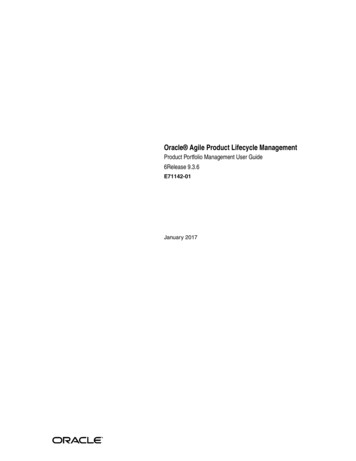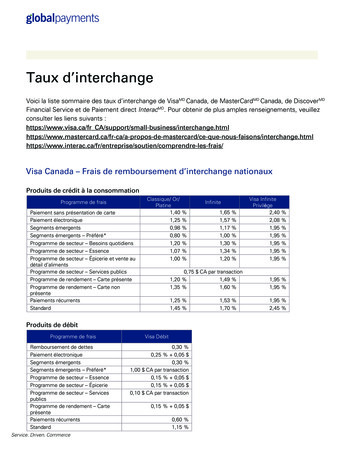
Transcription
“I have had the privilege of personally knowing Jen Wilkin for several years. She isa woman intoxicated by the God of the Bible and has written None Like Him bystaring at his majesty. The soul is healed not by gazing at its broken pieces, but bygazing at the beauty of its Creator and surrendering to the ‘I can’ts, but he cans.’I pray you melt into the relief of belonging to the One who is unlike any other asyou read this book.”Matt Chandler, Lead Pastor, The Village Church, Dallas, Texas; President,Acts 29 Church Planting Network; author, The Mingling of Souls“In an upside-down world that has humanized God and deified man, Jen Wilkinbrings us the best news imaginable: our God is infinitely greater, more powerful,more majestic, and more wonderful than we can possibly fathom. Jen calls us to liftour eyes upward, to earnestly contemplate his attributes, and to humbly acknowledge our own limits. As we do, our hearts will be filled with wonder and awe thatsuch a God should stoop to save and love us.”Nancy DeMoss Wolgemuth, author; radio host, Revive Our Hearts“My wife and I love Jen Wilkin. She represents a rising generation of evangelicalwomen discontent with the status quo, yet fiercely committed to the Scriptures. Herteaching is provocative without approaching compromise, revolutionary withoutseeking novelty. This book is rock solid, and it portends an encouraging future forevangelicalism.”J. D. Greear, Lead Pastor, The Summit Church, Durham, North Carolina;author, Gaining By Losing“Far beyond a Sunday school lesson listing the attributes of God, None Like Himevokes a sense of both familiarity and wonder around the characteristics of theAlmighty we worship. This book puts us in our place, beneath the God of all andover all.”Kate Shellnutt, Associate Editor, Christianity Today magazine, Her.meneutics“This book made me want Jen Wilkin as my best friend. But far more than that, itmade me grateful that Jen Wilkin’s God is my God. Books that are this theologically rich while also being this funny, this personal, and this penetrating are rare.So don’t miss this one.”Nancy Guthrie, Bible Teacher; author, Seeing Jesus in the Old TestamentBible study series“Many of us attribute to God the characteristics of our fallen earthly fathers. In thisstudy, Jen walks us through a better foundation for knowing and relating to ourFather in heaven—Scripture itself. None Like Him is a helpful resource that remindsus that ‘the knowledge of the Holy One is understanding.’”Wendy Horger Alsup, mother; author, Practical Theology for Women andThe Gospel-Centered Woman
“What happens when women learn about the attributes of God? They rightfullypraise him for who he is! Jen Wilkin has written a helpful book introducing theattributes that belong to God alone, while revealing our own tendencies to try toproduce counterfeits in others or ourselves. A better understanding of who God isbuilds our faith and helps to guard against damaging theology. Jen presses the readerto see how God’s incommunicable attributes affect our own spirituality.”Aimee Byrd, author, Housewife Theologian and Theological Fitness“This wonderful book is big on truth and big on God, which means it is very goodfor my soul. Jen’s exploration of God’s attributes and her reminder of all the waysI’m not God and don’t have to be God ministered to me as a wife, as a mother, andas a Christian. If true wisdom starts with the knowledge of God and the knowledgeof ourselves, then here is a book full of wisdom.”Trisha DeYoung, happy wife to Kevin DeYoung, author of Just DoSomething and Crazy Busy!; stay-at-home adventurous mother of six“Many of us believe that greater peace and self-awareness come from exploring ourown psyche or learning what makes us tick. But Jen Wilkin believes that greater selfknowledge comes from knowing and reverencing the One who is knowledge himself.In None Like Him, she invites us to learn how God’s nature transcends our ownand why the difference between us is good news. In fact, it’s the very best news.”Hannah Anderson, author, Made for More and Humble Roots“In my ministry to college students, I am rarely asked questions about morality ortheology. They ask for wisdom. Young people yearn to know how the world worksand how to work well within it. Jen sets us on the right path by inviting us all tothe essential starting point: awestruck-wonder at our Maker. We must see how theeternal connects with the mundane if our lives are going to be filled with a senseof meaning. This is a resource that I would love to see in the hands of all of ourstudents.”Ben Stuart, Executive Director, Breakaway Ministries
None Like Him
None Like Him10 Ways God Is Different from Us(and Why That’s a Good Thing)Jen Wilkin W H E AT O N , I L L I N O I S
None Like Him: 10 Ways God Is Different from Us(and Why That’s a Good Thing)Copyright 2016 by Jennifer WilkinPublished by Crossway1300 Crescent StreetWheaton, Illinois 60187All rights reserved. No part of this publication may be reproduced, stored in aretrieval system, or transmitted in any form by any means, electronic, mechanical,photocopy, recording, or otherwise, without the prior permission of the publisher,except as provided for by USA copyright law. Crossway is a registered trademarkin the United States of America.Published in association with the literary agency of Wolgemuth & Associates, Inc.Cover design: Connie GabbertFirst printing 2016Printed in the United States of AmericaUnless otherwise indicated, Scripture quotations are from the ESV Bible (TheHoly Bible, English Standard Version ), copyright 2001 by Crossway, apublishing ministry of Good News Publishers. Used by permission. All rightsreserved.Scripture quotations marked KJV are from the King James Version of the Bible.Scripture references marked NIV are taken from The Holy Bible, NewInternational Version , NIV . Copyright 1973, 1978, 1984, 2011 by Biblica,Inc. Used by permission. All rights reserved worldwide.All emphases in Scripture quotations have been added by the author.Trade paperback ISBN: 978-1-4335-4983-0ePub ISBN: 978-1-4335-4986-1PDF ISBN: 978-1-4335-4984-7Mobipocket ISBN: 978-1-4335-4985-4Library of Congress Cataloging-in-Publication DataWilkin, Jen, 1969–None like Him : 10 ways God is different from us (and why that’s a good thing) / Jen Wilkin.pages cmIncludes bibliographical references and index.ISBN 978-1-4335-4983-0 (tp)1. God (Christianity)—Attributes. 2. Christian women—Religious life. I. Title.BT130.W55 2016231'.4—dc23 2015032435Crossway is a publishing ministry of Good News Publishers.RRD151427132612251124 2310922821720 19 18 1765432161
ContentsIntroduction: On Becoming a God-Fearing Woman 91 Infinite 15The God of No Limits2 Incomprehensible 31The God of Infinite Mystery3 Self-Existent 43The God of Infinite Creativity4 Self-Sufficient 57The God of Infinite Provision5 Eternal 69The God of Infinite Days6 Immutable 83The God of Infinite Sameness7 Omnipresent 93The God of Infinite Place8 Omniscient 107The God of Infinite Knowledge
9 Omnipotent 123The God of Infinite Power10 Sovereign 139The God of Infinite RuleConclusion: Fearful and Wonderful 153Notes 159Scripture Index 161
IntroductionOn Becoming aGod-Fearing WomanCharm is deceitful, and beauty is vain,but a woman who fears the Lord is tobe praised.Proverbs 31:30If you had told me five years ago that I would one day writea book for Christian women that led off with a quote fromProverbs 31, I probably would have punched you in the face.Arguably no chapter in Scripture is more over-referenced whenit comes to addressing women, but stick with me as we teeter onthe brink of cloying triteness. For the purpose of the business athand, I think Proverbs 31:30 deserves a second look—for whatit says about women, and more, for what it says about God.In my mother’s house hang two small, oval portraits of aman and a woman dating back to the late 1700s. They are Davidand Nancy Coy of Homer, New York, my great-grandmother’s9
On Becoming a God-Fearing Womangreat-grandparents on my mother’s side. We refer to them affectionately as “the ancestors,” upstanding citizens of Congregationalist and Presbyterian stock, whose very frowns seem intenton keeping civilization from faltering. I take from their frozenexpressions that life was not easy for them. Nancy, in particular, wears the look of a woman who doesn’t get the joke. Onesuspects that if the artist had broadened his scope to include hertorso, we would find her hands death-gripping a worn copy ofthe KJV. Like the portraits of other women of her time period,she is the very embodiment of the image we conjure when wehear the phrase “God-fearing woman.” To call someone thattoday would sound archaic, maybe even tongue-in-cheek, butin Nancy’s day it would have been recognized as high praise, adirect reference to Proverbs 31:30.Today if we wanted to praise a woman as godly we wouldprobably say something like, “She is so in love with Jesus,” or,“She has such a deep walk with the Lord.” The stereotypicalportrait of this woman would be a soft-focus stock photo involving a field, filtered sunlight, out-flung arms, and a beatificsmile, a little like a still shot of Julie Andrews from that openingscene in The Sound of Music. It’s not a bad way to picture godliness, but it is quite a contrast to Nancy. And it leaves me wondering, in deference to Nancy, if there isn’t some room for usmodern women to ask what has happened to our idea of being a“God-fearing woman.” I’m not suggesting Nancy knew a betterversion. I’m actually wondering if a more accurate conception ofa God-fearing woman lives somewhere between a solemn scowland a saccharine smile.A somewhat less-than-shocking confession at this point: IfI had to choose a verse from the Bible that has impacted methe most, it wouldn’t be found in chapter 31 of Proverbs. It10
On Becoming a God-Fearing Womanwould be Psalm 111:10. I came across it during my early twenties, a time during which I sensed I desperately needed to growin wisdom but lacked a clear idea of where to start. Should Istudy theology? Get a mentor? Memorize Scripture? My faithat that time was primarily shaped by a feeling: my deep loveof God. But I knew I needed wisdom about how to follow theGod I said I loved. And one day in my reading, there was Psalm111:10 answering my question of where to begin in a most unexpected way:The fear of the Lord is the beginning of wisdom.I had to read it several times to let it sink in. The wisdom Ilonged for started where? Of all the possible origin points forwisdom, fear of the Lord was not one I would have come upwith on my own. This was not a verse that made me want tocue the music, fling out my arms, and twirl in a field. The Godof my church upbringing was a snuggly Daddy-God, one whoI pictured to be much like my gentle and deeply affectionateearthly father. The concept of fearing God was foreign to me.How could the path to wisdom have as its starting point the fearof the Lord? Scanning the verse, my eyes kept trying to replacethe word fear with love. Shouldn’t the love of the Lord be thebeginning of wisdom? How could the Bible say in one breaththat perfect love casts out fear and then turn around and say thatfear was the first step toward wisdom?My conception of God was that he was approachable andaccessible, the God that the Lord’s Prayer endearingly refers toas “Our Father.” And he is that. He is mercifully and gloriouslythat Father. But what the fear of the Lord acknowledges is thathe is not only that. He is also “in heaven,” with a name that ishallowed above all others. He is both a God who is near to us11
On Becoming a God-Fearing Womanand a God who transcends. The fear of the Lord comprehendsthe fact that the Father we are taught to call “ours” is also theLord of the universe, enthroned between the cherubim, doing ashe pleases among the nations.Not all of us grew up with a snuggly earthly dad, much lessa concept of an approachable Daddy-God. Despite knowing thegrace of salvation, many of us still suspect that God (like Nancy)is perpetually scowling reproachfully in our direction. But theBible paints for us a picture of a God who neither scowls norcoddles, a God who is both “Our Father” and “in heaven” inperfect balance. Finding that balance requires gaining a goodworking definition for how Psalm 111:10 uses the word fear.And for that, we can turn to the book of Hebrews.The author of Hebrews takes care to distinguish betweenthe fear of God’s consuming wrath and the fear of God’s holiness. Both may cause us to tremble, but only the second causesus to worship and repent. Because of Christ, you and I do notcome cowering to fearsome, thundering Mount Sinai; instead wecome expectantly to glorious, approachable Mount Zion (Heb.12:18–24). We are exhorted to respond to this God by offeringhim “acceptable worship, with reverence and awe, for our Godis a consuming fire” (vv. 28–29). Worshipful reverence and awe,not cowering dread, define a right fear of the Lord.The worshipful reverence and awe of the Lord is the beginning of wisdom.When we fear the Lord rightly, we do so not as those whoare terrified of him. Christ, our Mediator, assures us that wemay approach the throne of God with confidence. We do nottremble as the demons do; they rightly fear the wrath of God.Rather, we tremble as those who understand that God’s wrath12
On Becoming a God-Fearing Womantoward us is satisfied at the cross. When we fear God rightly,we recognize him for who he truly is: a God of no limits, andtherefore, utterly unlike anyone or anything we know. This isthe start of becoming wise.But consider the inverted message of Psalm 111:10. Not onlyis the fear of the Lord the beginning of wisdom, the fear of manis the beginning of folly. This is the dual exhortation of Proverbs31:30 that we need so desperately to understand:Charm is deceitful, and beauty is vain [the fear of man isthe beginning of folly]but a woman who fears the Lord is to be praised [thefear of the Lord is the beginning of wisdom].When we lose sight of the majesty of God, we invariably fillthe gap in our vision with the fable of the majesty of someoneelse. We revere a spouse or a leader. We worship our children ora friend. We even give reverence and awe to ourselves. And thisis complete folly. Not only is it unwise to give our worship tosomeone other than God, it is the very definition of irrationality.And it’s an exhausting business.So this is a book that hopes to reclaim the idea of the “Godfearing woman” from yellowed portraits in antique oval frames,as well as from the soft-filtered script-adorned frames of Instagram. In the pages that follow, I want us to consider the majestyof a limitless God. I want us to meditate on his perfections sothat they become to us the most rational object of our reverenceand awe. And along the way, I want us to stare down our tendency to ask others and even ourselves to be what only God is.Life is too short and too precious to spend fearing thewrong things in the wrong ways. I propose we learn holy fearfor a God like no other. Only then will our fear of man be13
On Becoming a God-Fearing Womanput to flight, our self-adulation be laid to rest, and our heartsbe turned toward worship. I want us to become God-fearingwomen in the truest sense of the word, to take our stand ingladness at the foot of Mount Zion, offering true worship toour Father in heaven. And in so doing, we’ll make a beginningat becoming wise.14
1InfiniteThe God of No LimitsLord, we adore thy vast designs,Th’ obscure abyss of Providence,Too deep to sound with mortal lines,Too dark to view with feeble sense.Isaac WattsOn the day I was born, the doctor who delivered me inscribedmy birth records with a firm hand: seven pounds, eleven ounces,twenty-one inches. It was the first legally attested evidence thatI was not God.I would contribute ample proof to that effect in the ensuingyears, but during the earliest moments of my life on February 4, 1969, well before I formed my first rebellious thought,uttered my first defiant syllable, or took my first disobedient step, the chasm between who God is and who I am had15
None Like Himalready been firmly established by the simple fact that I wasmeasurable.Any discussion of how God is not like us must begin withan acknowledgment that we are measurable and he is not. Godis infinite, unbound by limits. He defies measurement of anykind. His limitlessness underlies all of his attributes; his power,knowledge, love, and mercy are not merely great, but they areinfinitely so, measurelessly so. No one can place any aspect ofwho God is on a scale or against a yardstick.This makes the task of writing a book about his attributesparticularly daunting. One of my favorite hymns speaks to themeasurelessness of just one of God’s attributes: his love. Thehymnwriter reflects on the futility of trying to capture it:Could we with ink the ocean fill,And were the skies of parchment made;Were every stalk on earth a quill,And every man a scribe by trade;To write the love of God aboveWould drain the ocean dry;Nor could the scroll contain the whole,Though stretched from sky to sky.1I’m a feeble scribe working with scant ink and a very smallscroll. And my task is to share at least a few meager insightsabout ten of God’s attributes. Ten. I have never been moreaware of my limits. But I want to do my part in this ongoing effort to describe the Indescribable. Faithful writers havedone so for me. Stephen Charnock, Arthur Pink, A. W. Tozer,and R. C. Sproul have all explored the limitless character ofGod to my great benefit, and to lengths that I am not competent to go. But I hope in these pages to take the lofty view ofGod these writers have illuminated and ask a critical question:16
Infinite“How should the knowledge that God is change theway I live?” What measurable change should occur as a resultof meditating on God’s immeasurable attributes, as describedin the Bible?Why We Love to MeasureWe limited humans are lovers of measurement; we number andcount, quantify and track. If you were to look in your pantry,every carton would display the weight of its contents. Everyfood label would tell you the number of calories, fat grams,and carbs for a particular item. Your gas gauge tells you howmuch gas is in your tank. Your clock tells you how much timeyou have until dinner. Your budget tells you how much youcan spend. Your social media account measures your circle offriends. We are happily surrounded on all sides by systems ofmeasurement.Our compulsion to measure is not a recent development.Ancient peoples tracked the movements of the heavens; theirtools of measurement are still visible in canyon carvings andmonolith rings. They measured tides and seasons, the passing oftime. Measurement is the millennia-old obsession of the limitedhuman, who, perceiving his own limits, seeks to transcend themby quantifying his world. That-which-we-can-measure we thinkwe can to some degree control.One of my favorite movies is Hoosiers (1986). It tells thestory of a small-town basketball team from Hickory, Indiana,that finds greatness under the leadership of their coach, NormanDale. The end of the movie is not hard to predict, and the ’80ssynthesizer music in the score is a trial for the nerves. There’salso a scene in which Gene Hackman and Barbara Hershey earnthe undisputable title of “Most Awkward On-Screen Kiss in the17
None Like HimHistory of Filmmaking.” But at the 1:34 mark, the movie hitsa note of brilliance.Having reached the 1951 state finals, Coach Dale’s team ofsmall-town farm boys gets their first look at where the championship game will be played: a giant gymnasium, easily ten timesthe size of the small-town high school gyms they have playedin all season long. As the players’ eyes widen at the scene, Dalepulls out a tape measure. He asks a boy to measure and reportthe distance from the backboard to the free throw line. Fifteenfeet. He asks two players to measure the distance from the floorto the net. Ten feet.Smiling slightly, Dale notes, “I think you’ll find it’s the exactsame measurements as our gym back in Hickory.”The scene is brilliant because it illustrates a universal truth:being able to take the measure of something is reassuring. Itimparts to us a level of comfort and a sense of control.We humans attempt to measure not just our environmentsbut also our fellow humans. When we make a new acquaintance,or consider the viability of a political candidate, or interviewsomeone for a job, we assess their strengths and weaknesses. We“take the measure” of their character and abilities, so to speak.We attempt to quantify their attributes, to judge how worthythey are of our trust or support and to keep our expectationsrealistic.We also take the measure of self and others for the sake ofcomparison. Questions like, “Am I smart?” or “Am I rich?” or“Am I moral?” are answered with, “Relative to whom?” Wechoose our human yardsticks with care, often assuring ourselvesthat we will measure favorably by surrounding ourselves withpeople whose own shortcomings make us stand tall by comparison. We tell ourselves that compared to X, we are indeed quite18
Infinitesmart, rich, or moral. But unless our measure of comparison issmarter, richer, and more moral than we are, we will preservethe myth of our own ascendancy. We will believe ourselves tobe without rival. And that’s where a measureless God begins toupend our sense of personal awesomeness.Our Immeasurable, Measuring GodTo the human mind, preoccupied with quantifying creation andits inhabitants, seeking control by measurement and validationby comparison, the Godhead presents a conundrum. The Godof the Bible is infinite—immeasurable, unquantifiable, uncontainable, unbound, utterly without limit. We cannot take thefull measure of him no matter how hard we may try. We cannotconfine him to a physical or mental boundary. We cannot control him, and we can never stack up favorably beside him. Job’scompanion Zophar expresses our dilemma:Can you find out the deep things of God?Can you find out the limit of the Almighty?It is higher than heaven—what can you do?Deeper than Sheol—what can you know?Its measure is longer than the earthand broader than the sea. (Job 11:7–9)David praises the infinitude of God’s greatness:Great is the Lord, and greatly to be praised,and his greatness is unsearchable. (Ps. 145:3)Solomon, too, acknowledges the limitlessness of God:But will God indeed dwell on the earth? Behold, heaven andthe highest heaven cannot contain you; how much less thishouse that I have built! (1 Kings 8:27)19
None Like HimParadoxically, he who is immeasurable is himself the measure of all things. Note this beautiful contrast in Isaiah 40:Who has measured the waters in the hollow of his handand marked off the heavens with a span,enclosed the dust of the earth in a measureand weighed the mountains in scalesand the hills in a balance?Who has measured the Spirit of the Lord,or what man shows him his counsel? (Isa. 40:12–13)Put succinctly, who has measured everything? God has. Who hasmeasured God? No one.In striking paradox, God immeasurable concerns himselfwith measurements for arks and tabernacles, temples and cities. God unbound sets boundaries for oceans. He catalogs hairson heads. He numbers stars and grains of sand. Our limitlessGod specifies the length of our limbs and the circumferenceof our crania. He measures our very days in handbreadths,lovingly and with intent. And all that he measures is perfectin measurement. All that he binds is perfectly boundaried.Yet he himself is infinitely detailed—limitless, measureless,unbounded.The God of No LimitsWhat Zophar spoke, what David and Solomon worshiped, whatIsaiah comprehended is this: God has no rivals. Not only that,but he measures and decrees the boundaries by which his creation will abide. Our whole lives as Christ-followers are to begiven over to the identification and celebration of the limits Godhas ordained for us. He lovingly teaches them to us through hisWord, through trials, through discipline. He humbles us through20
Infinitethese means to remind us that we are not him, nor is anyone oranything else we know.There is none like our God. The God of the Bible is incomparable, infinitely above his creation. To say that anyone oranything is like him is to try to express the unlimited in limited terms. Any comparison will fall short. Just as the authorsof Scripture searched for adequate human language to applyto heavenly visions, we find ourselves ill equipped to expressGod’s perfections. But we must still endeavor to try. Like theIsraelites with their sandals still damp from the sand of the RedSea shoreline, we feel the weight of the question that hangs inmidair:Who is like you, O Lord, among the gods?Who is like you, majestic in holiness,awesome in glorious deeds, doing wonders?(Ex. 15:11)The psalmist, too, marvels:Who is like the Lord our God,who is seated on high,who looks far downon the heavens and the earth? (Ps. 113:5–6)The answer, of course, is no one. Creation, existing within thelimits of time and space, cannot rival, much less fully articulate,the splendors of a limitless God. Yet from our earliest moments,rivalry has been our intent.Becoming Like GodAs soon as my first child could crawl, he began exploring thelimits of his world. What was he allowed to touch? What was21
None Like Himoff-limits? Any parent can tell you that if you place a small childin an empty room with twenty objects, nineteen of which he isallowed to touch and one he is not, an interesting phenomenonwill take place. At first he may play contentedly with what isallowed, but before long he will turn his eyes toward the forbidden item. Soon he will begin moving closer to it, perhapsextending a hand toward it but not actually touching it. A gentlyworded warning may cause him to shift his gaze to his parentand reconsider his course, but eventually, barring physical intervention by that parent, he will almost certainly lay hands on theone object out of twenty he knows is not meant for him.I remember trying to conceal my laughter when this process played out before me. The moral tug-of-war within mychild was on full display, and it was comical both for its artlesshonesty and its familiarity. We do not outgrow the desire totest limits. With age, we may learn enough self-control not toput our drool-covered fingers in electrical outlets or write ournames on the wall in permanent marker, but we still carry in usthe same compulsion to do that which we ought not to do, toreach for that which we ought not to touch. We are line-crossers,boundary-breakers, fence-jumpers, carrying inside us a warpedbelief that our heavenly parent wants to withhold from us something that is needful or pleasurable. Even as we enjoy his goodgifts, we feel a hyperawareness of the boundaries he has set, andwe question their validity. Though he gives us nineteen gifts andwarns us away from one danger, we suspect that what is withheld is not dangerous but desirable.We see this exact pattern in the opening pages of the Bible.Lovingly placed in an environment designed for their safety anddelight, our parents Adam and Eve mistook being created in theimage of God as license to become like God. It was not enough22
Infiniteto bear his image within the limits of human existence. No, onlybecoming like him would do. The Creator was holding out onthem. But a crafty voice suggested that limitlessness was withinreach:But the serpent said to the woman, “You will not surely die.For God knows that when you eat of it your eyes will beopened, and you will be like God, knowing good and evil.”(Gen. 3:4–5)So the finite reached to pluck the infinite from a low-hangingbough, and human history began its corrosive pattern of Godrivalry, pitting and eroding every peak and crevice of creationwith the relentless repetitions of that first grasping, the longarmed reach of the human aspiring to the divine.Reflect or Rival?So it has been ever since: human beings created to bear the imageof God instead aspire to become like God. Designed to reflecthis glory, we choose instead to rival it. We do so by reachingfor those attributes that are true only of God, those suited onlyto a limitless being. Rather than worship and trust in the omniscience of God, we desire to be all-knowing ourselves. Ratherthan celebrate and revere his omnipotence, we seek ultimatepower in our own spheres of influence. Rather than rest in theimmutability of God, we point to our own calcified sin patternsand declare ourselves unchanging and unchangeable. Like ourfather Adam and our mother Eve, we long for that which is intended only for God, rejecting our God-given limits and cravingthe limitlessness we foolishly believe we are cap
“I have had the privilege of personally knowing Jen Wilkin for several years. She is a woman intoxicated by the God of the Bible and has written None Like Him by staring at his majesty. The soul is healed not by gazing at its broken pieces, but by gazing at the beauty of its










